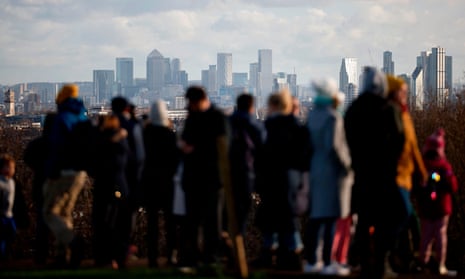Photographs of crowded beaches, parks and queues at food stalls outside popular walking spots, all at a time when the UK is on highest alert under tough coronavirus restrictions.
Despite Matt Hancock describing these as examples of “flexing the rules”, and Chris Whitty, England’s chief medical officer, warning that stopping to chat in the street is a potential threat, many continue to interpret the government’s strict “stay at home” message as liberally as they can.
Crisis fatigue and complex messaging have played their part. But, according to psychological experts, erosion of trust in the government’s messages is perhaps the biggest contributory factor towards people bending the rules as much as they can.
Compliance is dropping. “What is happening is people are beginning to flout the rules, they are beginning to think, ‘How can I get away with the rules?’” Paul Netherton, Devon and Cornwall’s deputy chief constable, told BBC Breakfast.
According to Patricia Riddell, professor of applied neuroscience at Reading University, the government’s already difficult task of persuading us, as social animals, to do something we don’t want to do has been severely undermined by constant U-turns, mixed messaging and the “Dominic Cummings effect”.
People had to understand the “value” in adhering to rules, said Riddell. “If you’re saying we are doing this to support the NHS, yet the mouthpiece that’s telling you that has done the clap for carers but not given the nurses a wage rise, or has built the Nightingale hospitals and then they just disappeared; if their behaviour is not matching the value that they are trying to instil in us, then people are just going to think, ‘Well why should we be setting a higher personal value than you’re prepared to demonstrate?’”
The government was, she said, failing at “reaching people’s personal values”.
Mixed messaging, such as allowing builders into your home, but not your mother, had also led to a more liberal interpretation and “finding ways to break the rules”.
“We are doing this matching process, and people bend the rules a little bit because of that matching process.”
She added: “There have been so many U-turns that I think [the government] has lost credibility.
“I think the message that might get through to people is that this virus [is] so much more contagious. If you get it, you are much, much more likely to pass it on to other people you love. That is the personal value to appeal to now.”
Prof Pam Briggs, chair of applied psychology at Northumbria University, said people were more likely to conform to the social norm, rather than accept edicts.
Photographs this weekend of crowds on Tynemouth Longsands beach in North Tyneside or the queues outside food stalls on Hampstead’s high street contributed to how people behaved.
As psychologists referred to the “broken window” effect, “of course here, we’re back to the Dominic Cummings effect,” she said. One broken window in an urban environment creating a ripple effect, with people taking less care. High-profile cases of rule breakers, such as Cummings, and Sky presenter Kay Burley, had a knock-on effect.
“We are social beings. We really tend to do what we see other people doing. Rather than edicts telling us what to do, we follow the social norm,” she said. “So it really does become very important when you see people breaking the rules, and getting away with it.”
People also had to trust measures would genuinely be effective. But, with social media and mainstream media, they could compare measures taken in other countries – and in the UK different lockdown rules in Scotland, Wales, Northern Ireland and England exacerbated this. “So there isn’t the consistency, and so people have some margin for challenge: ‘Why are we doing this, but others are not doing that?’” said Briggs.
Some would not adhere if they could not rationalise why they were being told to do something. Moving the Christmas socialising from five days to one was a good example, she said. Another would be why it was riskier to walk with a friend holding a hot drink than to walk with a friend without a hot drink, such as the two women fined by Derbyshire police for doing just that.
“And so you get erosion of trust in the government and rule-makers,” said Briggs.
Psychological theories suggested that to take protective measures, people had to understand the threat was genuine. Threat expressed in numbers – such as graphs on NHS capacity – were less easy for people to relate to than human stories of those on the frontline, or of victims, she said.
Dr Sophie King-Hill, a senior fellow at the Health Services Management Centre at the University of Birmingham who teaches master’s degree courses for NHS managers, said the “complexity and confusion” over the rules meant many people, particularly those not internet savvy, were unsure of what was allowed.
She also pointed to erosion of trust in the government’s messages, particularly due to the 11th-hour U-turns, including over school closures, as leading to rule flexing.
The “we’re all in this together” sentiment had been destroyed by the tier system, she said.
“What has happened is it has made people more covert, so they get cleverer at breaking the rules, and it becomes about that dichotomy, rather than about the pressure on the health system,” she said. The mantra “save the NHS” had been lost.
The first step to the government regaining trust was “transparency”. “I think they have to come out and say we have made a catalogue of mistakes and we’re sorry. But it’s going to take some rebuilding,” she said.
